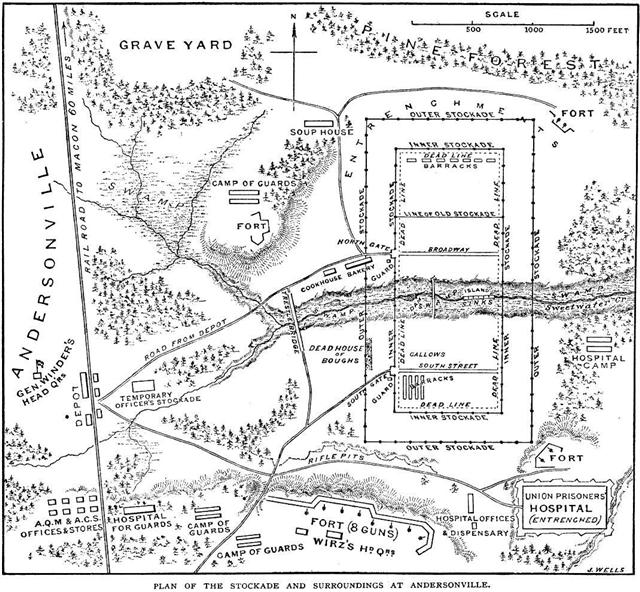

THE stockade was formed of pine logs planted in the ground. The inner or main stockade was twenty feet high; outside of it were two other stockades not far apart (indicated by a single line in the above plan), the inner one sixteen feet high and the outer twelve. On November 27, 1863, the site of the prison was chosen by W. S. Winder, son of General J. H. Winder who arrived to take command in April, 1864. The first detachment of Union prisoners reached the prison on the 15th of the previous February. Winder's reputation in connection with the Richmond prisons was so bad that the Richmond "Examiner" said, when he was sent South, "God have mercy upon those to whom he has been sent." Winder died Feb. 9, 1865. Captain Henry Wirz, who commanded the stockade, was a native of Switzerland, a physician by profession and before the war was a citizen of Louisiana. In August, 1865, he was tried by a Union Military Commission, and executed.
In the summer of 1864 Lieutenant-Colonel D. T. Chandler officially inspected the Andersonville prison; his report is dated August 5, and in it he begged the Richmond government to send no more prisoners to that pen and to remove all of the prisoners then there, above 15,000; that is, he reported that 20,000 to 25,000 prisoners ought to be provided for elsewhere. He also said in his report;
There is no medical attendance provided within the stockade. Small quantities of medicine are placed in the hands of certain prisoners of each squad or division, and the sick are directed to be brought out by sergeants of squads daily, at 'sick-call,' to the medical officers who attend at the gate. The crowd at these times is so great that only the strongest can get access to the doctors, the weaker ones being unable to force their way through the press; and the hospital accommodations are so limited that though the beds (so called) have all or nearly all two occupants each, large numbers who would otherwise be received are necessarily sent back to the stockade. Many—twenty yes-terday—are carted out daily, who have died from unknown causes and whom the medical officers have never seen. The dead are hauled out daily by the wagon-load and buried without coffins, their hands in many instances being first mutilated with an ax in the removal of any finger-rings they may have. The sanitary condition of the prisoners is as wretched as can be, the principal causes of mortality being scurvy and chronic diarrhea. Nothing seems to have been done, and but little if any effort made to arrest it by procuring proper food. The ration is 1/3 pound of bacon and 1 1/4 pound unbolted corn-meal, with fresh beef at rare intervals, and occasionally rice. When to be obtained—very seldom — a small quantity of molasses is substituted for the meat ration. A little weak vinegar, unfit for use, has sometimes been issued. The arrangements for cooking and baking have been wholly inadequate, and though additions are now being completed it will still be impossible to cook for the whole number of prisoners. Raw rations have to be issued to a very large proportion, who are entirely unprovided with proper utensils, and furnished so limited a supply of fuel they are compelled to dig with their hands in the filthy marsh before mentioned for roots, etc. No soap or clothing has ever been issued. The present hospital arrangements were only intended for the accommodation of the sick of 10,000 men, and are totally insufficient, both in character and extent, for the present needs; the number of prisoners being now more than three times as great, the number of cases requiring medical treatment is in an increased ratio. . . . My duty requires me respectfully to recommend a change in the officer in command of the post, Brigadier-General J. H. Winder, and the substitution in his place of some one who unites both energy and good judgment with some feeling of humanity and consideration for the welfare and comfort (so far as is consistent with their safe keeping) of the vast number of unfortunates placed under his control ; some one who at least will not advocate deliberately and in cold blood the propriety of leaving them m their present condition until their number has been sufficiently reduced by death to make the present arrangement suffice for their accommodation; who will not consider it a matter of self-laudation and boasting that he has never been inside of the stockade, a place the horrors of which it is difficult to describe, and which is a disgrace to civilization ; the condition of which he might, by the exercise of a little energy and judgment, even with the limited means at his command, have considerably improved.
visits since 02/21/2004.
Page updated
05/25/2006